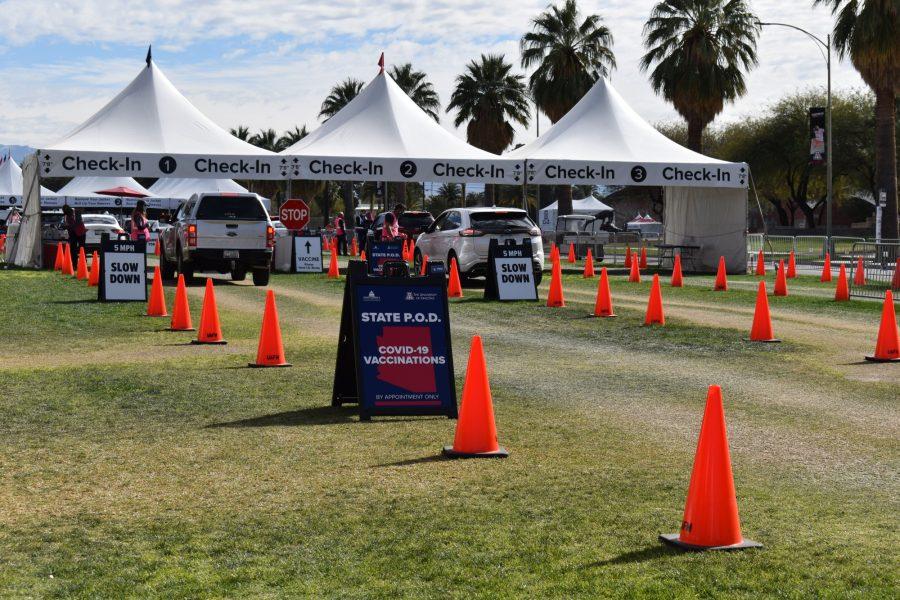The University of Arizona is participating in a nationwide COVID-19 post-vaccination study to help determine whether or not vaccinated individuals who are exposed to COVID-19 are still able to transmit the virus to others.
This study is a part of PreventCOVIDU, an initiative that was announced on March 26 by Dr. Anthony Fauci, the director of the National Institute of Allergy and Infectious Diseases. The study will be overseen by researchers at the COVID-19 Prevention Network, which is housed at the Fred Hutchinson Cancer Research Center in Seattle, according to a UA Health Sciences press release.
Currently, the UA is seeking nearly 700 college students ages 18 to 26 to participate in the four to five month study that will help grant researchers the knowledge to “help end the pandemic,” according to Dr. Elizabeth Connick, the principal investigator of the study and chief of the UA College of Medicine’s Division of Infectious Diseases.
“The study won’t be open forever,” Connick said. “They’re looking for 12,000 participants and when they get them, the study is closed. So we’re competing with people all over the country.”
So far, the study at the UA only has around 25 participants. The lead investigators hope to enroll at least 100 students in the coming weeks, according to co-lead investigator Dr. Lori Fantry, the associate clinical director of the UA College of Medicine’s Division of Infectious Diseases.
Participants will receive the Moderna COVID-19 vaccine either at the start of their enrollment or be deferred to getting the vaccine four months later, according to PreventCOVIDU’s website.
Students who participate in the study will also be required to complete daily nasal swabs, provide occasional blood samples and answer daily questions in the study’s eDiary app throughout the four months, along with following the UA’s existing COVID-19 testing policies, according to Fantry.
Additionally, participants will disclose their “prospective close contacts,” who will be invited to join the study. These close contacts can be a roommate or coworker who “could potentially become infected,” according to PreventCOVIDU’s website.
“This is the most intensive study that I am aware of that looks at people daily to see if they are having an asymptomatic infection,” Connick said. “If you look at them once a week or if you look at them only if they have symptoms, you’re going to miss the asymptomatic infection. We know that the vaccines protect against severe disease and hospitalization, but what we don’t know is if they protect against asymptomatic infection in transmission. And that’s very important to know because it will dictate what sort of precautions we need to take.”
Compensation will be offered to participants at various stages of the study. Those who complete the four-month study can receive up to $997, according to Connick.
“I think students should participate if they want to contribute to this historic trial and be part of something much bigger,” said Marcela Yubeta, a UA senior majoring in public health and College of Medicine Youth Advisory Board member. “Students can perhaps lead the road back to normalcy. To defeat the common threat we share, we must come together and use the tools we have to tame COVID-19. By joining this study, they are building immunity for our community.”
As the study continues to recruit students at the UA, the lead investigators plan to open up enrollment to other post-secondary institutions in the area.
“We’re going to open it to Pima Community College, and then, we’re even doing places like vocational schools, just to make sure we get enough people enrolled and involved and help solve the problem,” Fantry said.
For now, UA students who want to participate in the study can call (520) 621-8349 or email CovidVaccineStudy@arizona.edu for more information.
“The study gives you the chance to be part of the solution. You know, we’ve all been in the throes of this pandemic in the last year, and it’s impacted our lives, our families, our loved ones, in so many ways and so many people have been lost,” Connick said. “And this is actually something that you can do to contribute, to help move us ahead to get over this.”
Follow Elvia Verdugo on Twitter









